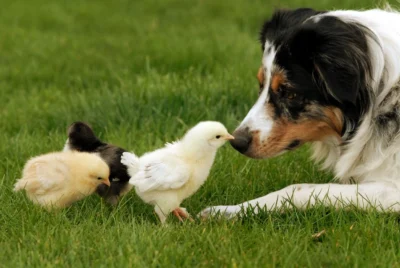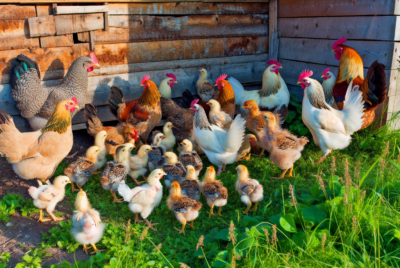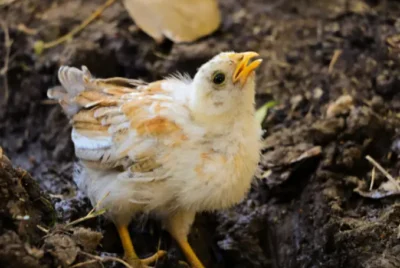Warning Signs When Chickens Are Bored (How to Stop These)
Did you know that chickens, too, can feel bored? While they might not show it in ways we immediately recognize, bored chickens can display a range of troubling behaviors that can lead to bigger problems for your flock.
Understanding and spotting these warning signs when chickens are bored is crucial for chicken keepers. So, let’s discover how to recognize when your chickens are feeling restless and learn effective ways to keep them entertained and happy.
Chicken Behavior When They Are Bored
Feather Picking
Feather picking is often the first noticeable sign of boredom in a flock of chickens. It’s essential to recognize this behavior early, as it can lead to severe problems if left unchecked. Here’s what to look out for:
- Feather Loss – When one or more chickens start losing feathers, it clearly signifies trouble. Chickens naturally molt and shed feathers, but excessive feather loss outside of the molting season is a red flag.
- The “Bottom Bird” – In most flocks, there’s a chicken at the bottom of the pecking order. This bird is particularly vulnerable to bullying when boredom sets in. Keep a close eye on this chicken, as it is often the first victim of feather picking.
- Broken Feathers – Observe the condition of the feathers you find. If they are broken rather than naturally shed, it’s likely due to feather picking.
Feather picking can lead to injuries, skin problems, and even infections. To combat this issue, I highly recommend ensuring your chickens have adequate space, stimulating environments, and access to nutritious food. Address any overcrowding or hierarchy issues within your flock promptly.
Read also: Why Chickens Eat Feathers and How to Prevent It
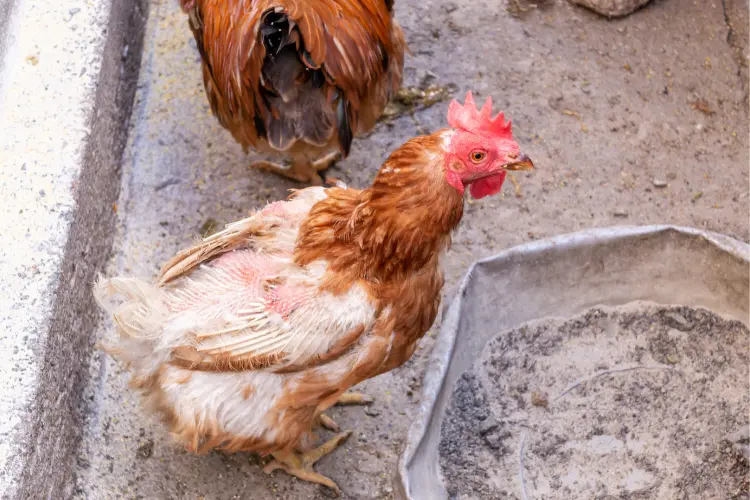
Egg Eating
Egg eating is another concerning behavior that can arise when chickens are bored. It can be challenging to spot initially, but there are some signs to watch for:
- Reduced Egg Production – If you notice a sudden drop in egg production without any apparent health issues, it could be due to egg eating. Chickens that are bored may resort to this behavior as a pastime.
- Cracked Eggs – Inspect your collected eggs for cracks or damage. Chickens that have developed a taste for eggs may intentionally break them to eat the contents.
- Messy Nests – If you find your nesting boxes in disarray, with eggshells scattered about, this is a clear indication that egg eating may be occurring.
To prevent egg eating, I advise collecting eggs frequently, providing a balanced diet with sufficient nutrients, and considering adding distractions to their environment to keep them mentally and physically engaged.
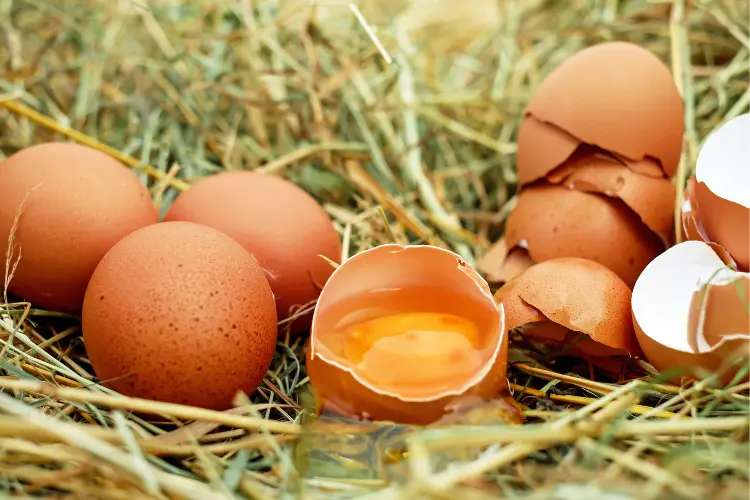
Hen Destruction
Destructive behavior can manifest in various ways when chickens are bored. They might start messing with things they typically ignore. Here are some warning signs of hen destruction:
- Pecking at Objects – Chickens may start pecking at items within their reach, such as netting, coop furnishings, or even each other.
- Excessive Rooster Behavior – If you have roosters in your flock, they may become overly aggressive or engage in excessive mating behaviors when bored.
To address hen destruction, provide a stimulating environment with chicken toys, perches, and interesting objects. Ensure your coop is chicken-proofed to prevent damage, and consider separating birds that exhibit aggressive behaviors.
Excessive Sitting or Lethargy
One of the most noticeable signs of boredom in chickens is excessive sitting or lethargy. Chickens are naturally active creatures, and when they become bored, they may:
- Spend long periods sitting or lying down.
- Show a lack of interest in foraging for food or exploring their environment.
- Appear listless and unenthusiastic.
Lethargy in chickens can lead to physical weakness and health problems. It’s important to address this issue promptly to ensure the well-being of your flock.
Aggressive Behavior
Boredom can also manifest as aggression within the flock. Chickens may become:
- More territorial and possessive over food and resources.
- Engaged in frequent disputes and pecking-order conflicts.
- Prone to pecking at coop furnishings or even each other.
Aggressive behavior can result in injuries, stress, and a disrupted social order among your chickens. Recognizing and managing this behavior is essential for maintaining a harmonious flock.

Excessive Vocalization
Chickens are known for their vocalizations, but when they are bored or stressed, their vocalization patterns can change. Signs of excessive vocalization of bored birds may include:
- Constant clucking or squawking throughout the day.
- Noisy and restless behavior, especially when confined.
- Unusual vocalizations that are louder or more frequent than usual.
Excessive vocalization can be disruptive, indicating that your chickens are not content. It’s important to identify the root cause and address their boredom to reduce noise levels.
How Do You Stop Your Chickens Getting Bored?
Spacious Outdoor Area
Providing your chickens with ample outdoor space is one of the most effective chicken boredom busters. If you have a garden or meadow, allow your chickens to roam freely. For added safety, you can always install a chicken wire around their area to keep them safe from predators.
The opportunity to peck, scratch, and forage in a larger area not only keeps them active but also fulfills their instincts. Chickens instinctively return to the coop in the evening, simplifying the task of closing the coop door behind them for safety .
Provide Opportunities for Play
Chickens need stimulation just like any other animal. Furnish your chicken coop and run with various features, such as perches, ladders, tree stumps, or ornaments of different heights for them to climb on and off.
Consider adding a chicken swing or other toys like mirrors because hens love shiny things and their own reflections to keep them engaged and keep the flock busy. These features provide mental and physical challenges, preventing boredom.
For a comprehensive list of fun additions, check out my review on the best toys for chickens for 2023. These toys not only offer entertainment but also provide mental and physical challenges, preventing boredom.
Weather Considerations
While chickens can handle some adverse weather conditions, they shouldn’t be confined to the coop solely due to inclement weather.
A bit of rain, snow, or wind is generally tolerable, and chickens often enjoy the outdoors even when it’s muddy. Only lock them up if weather conditions are exceptionally harsh.
Treats and Hide-and-Seek
Concealing tasty treats in their environment can be an enjoyable way to keep chickens entertained. Place treats inside wicker balls or hang greens just out of reach, encouraging them to jump and explore.
Store-bought or homemade suet-and-seed pecking blocks can also be a delightful treat, but remember to offer them in moderation to ensure a balanced diet.
Creating Activity Zones
Set up different activity zones within the chicken run or coop, like piles of hay, straw, leaves, or garden compost. Chickens love to scratch and rummage through these piles, discovering tasty insects and worms.
These zones can be “leveled” by your chickens in no time, adding an element of novelty to their environment.
Introduce Novelty
Chickens are naturally curious and are intrigued by new items in their surroundings. Simple additions like easy-to-make boxes, trays of straw, old brushes, or even an old mirror can capture their attention and make chickens busy.
Dust Bathing and Grooming
A dust bath is a favorite activity among chickens. Provide them with a designated area for dust bathing, which helps preen and maintain their feathers. Chickens will enjoy this activity throughout the year, not just during the hot summer months.
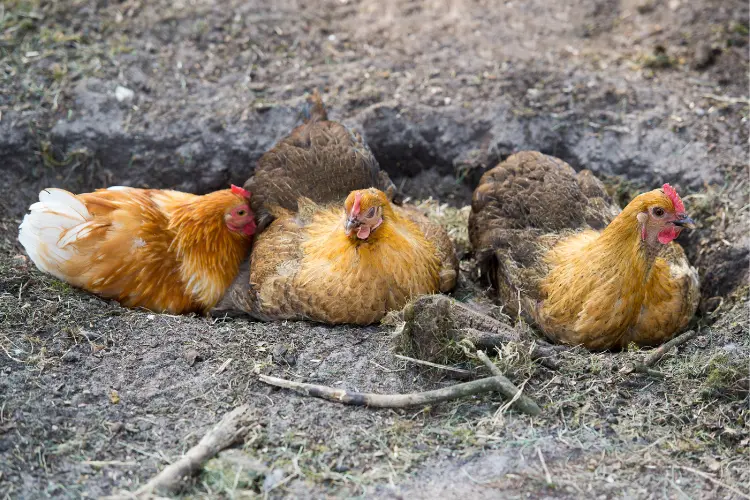
Quality Time and Interaction
Lastly, don’t underestimate the importance of interaction with your chickens. Spend time with them, and they will come to trust and enjoy your company. Friendly chickens may even be curious enough to join you at the garden table to see what you’re doing.
How Can You Tell If Your Chickens Are Happy?
You can tell chickens are happy by watching their behavior. Happy chickens are active and curious. They’ll scratch around in the dirt, peck at things, and explore their surroundings. They’ll often chat with soft clucks and sometimes even sing.
Their feathers look shiny and neat, and they have a bright, alert look in their eyes. If they’re laying eggs regularly and the eggs have strong shells, that’s another good sign.
How Many Hens Should You Keep To Ensure Their Happiness?
Chickens are like people when it comes to having friends—they don’t like being alone. It’s essential to have at least two chickens so they can keep each other company. But having a few more, like 3 to 6, is even better. In a little group, they can chat, play, and do all their chicken things together.
Think of it like kids at a playground: one kid alone might feel lonely, but a few kids together will have a lot of fun! So, if you’re thinking about getting chickens, it’s good to have a small group of them to make sure they’re happy.
Do Chickens Enjoy Being Picked Up?
Do chickens like hugs? Well, just like people, chickens have their own personalities. Some might be shy, while others can be real cuddle bugs. Many backyard chickens get used to their owners and can even look forward to being gently lifted and talked to.
If you’re kind and soft with them, over time, a lot of chickens start to enjoy this special time with their humans. Just remember, always be gentle and watch how they react – if they seem scared or stressed, it’s best to give them some space.
Do Chickens Have Fun Together?
Yes, chickens do have fun together! If you watch them, you’ll see that they often play around, scratching in the dirt, chasing bugs, and sometimes even playfully pecking or running after one another.
They’re social birds, and just like how people enjoy spending time with friends, chickens like hanging out and having fun with their flock mates. It’s always a lively scene when chickens are together, full of activity and playful interactions.
Wrapping Up
So, next time you notice your chickens showcasing some odd behaviors, take a moment to see if they might just be bored. With a little effort and creativity, you can keep your feathery pals entertained, happy, and healthy. After all, happy chickens mean a happy coop.


